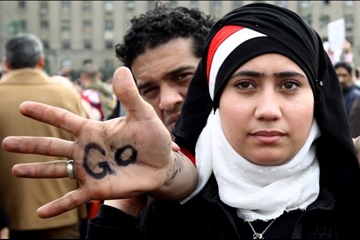Story published February 1, 2011 by GlobalPost:
 CAIRO, Egypt — Pro- and anti-government protesters clashed in Cairo Wednesday despite calls by the Egyptian army for an end to the protests.
CAIRO, Egypt — Pro- and anti-government protesters clashed in Cairo Wednesday despite calls by the Egyptian army for an end to the protests.
Some of the pro-government demonstrators were members of the widely reviled police forces. People fought with fists, sticks and stones in Cairo’s central square.
Supporters of Egyptian President Hosni Mubarak turned out in larger numbers Wednesday. They carried signs and banners praising the Egyptian president.
Mubarak said Tuesday night on state television that he would not stand in planned September elections, but that he would stay to oversee the transition of power over the next seven months.
Following Mubarak’s statement, the army — which had said earlier this week that it would not fire on the crowds — said the protesters’ demands had been heard and that it was time to clear the streets.
The 10,000 or so still standing in Cairo’s central Tahrir Square when Mubarak’s announcement came at about 11 p.m. local time did not take the news well.
“We are angry, we want him to leave now, not months from now,” said Hassam Abdel Monem, a 27-year-old plumber whose voice, like most of the protesters here, was hoarse from days of screaming. “I will keep coming here every night until he leaves.”
The crowd erupted in anger after the recorded speech, which was broadcast on white sheets hanging in the square. Protesters, in one of the most insulting gestures in this region, removed their shoes and held them up in the air in the direction of the screens.
Hesham Al Bastawisi, 43, said he was happy that Mubarak would not run for re-election but worried the longtime authoritarian ruler would find a way in the next few months to hold onto power, either on his own or through someone allied with him.
“We are happy, but we don’t trust him,” Al Bastawisi said. “We need to be able to trust him. Those were just words. I have a lot of patience, I can wait this out.”
Karim El Rais, a student, was even more direct. “Mubarak didn’t say anything new. This is our revolution. We are ready to die here waiting for him to leave. My address is now Liberation Square.”
Mubarak, however, appears to be as stubborn as the protesters. In perhaps his most defiant moment, the embattled president declared to the protesters that, “I will die on Egyptian soil.” It appears that Mubarak will not be going out like Tunisian President Zine El Abidine Ben Ali, who fled to Saudi Arabia in the wake of mass protests last month.
In his recorded address, Mubarak tried to appeal to his war hero status and to the fears of some Egyptians that if the president is forced out, chaos could erupt. Some residents outside of Tahrir Square, in fact, said after the speech that Mubarak should be allowed to leave office in dignity.
The announcement came shortly after U.S. diplomats told the Al Arabiya television station that U.S. President Barack Obama had called on Mubarak to not run in the upcoming elections, indicating the United States would no longer support its once strong ally.
Obama gave another televised address at 6:45 p.m., saying that he spoke directly to Mubarak and stressed the need for an orderly transition. While Obama was not clear whether that transition should occur under the leadership of Mubarak or not, he did say that the transition must be meaningful and peaceful and that it must begin now.
Anti-American sentiment has been high in the last few days. Egyptians said they were increasingly frustrated with what they called a “double standard” when it came to American foreign policy. They said the Americans promote democracy in some country’s but not in others.
Egyptians celebrated the election of Obama and welcomed his speech to the Muslim world in Cairo in 2009. But lately, many Egyptians said, Obama’s foreign policy looks similar to that of former U.S. President George W. Bush, who was widely reviled in the Middle East.
Mubarak’s statement came after more than 200,000 people, in the largest demonstration yet, flooded Cairo’s main square on Tuesday, heeding the call of opposition leaders for a “march of a million.” Protesters Tuesday night again called for millions to flood the streets on Wednesday.
